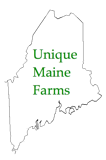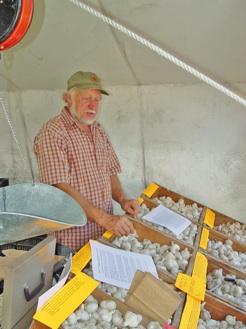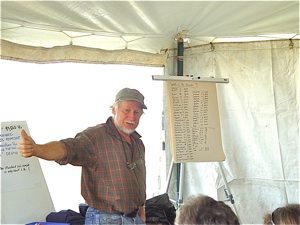Mark Fulford, a highly respected and world-renown farmer, consultant, and educator, was invited by Vera Francis to conduct a day-long workshop in May 2012 at Sipayik, the Passamaquoddy Reservation. Mark thoroughly enjoyed the time that he spent that day and explained that he tried to coordinate the flow of the workshop with the focus of the tribe to take action on food production for the families and the interest of the tribe as a whole.
Fulford commented that he was honored to see so many Elders in attendance at the workshop and that an effort had also been made to include the younger generation of school children in the presentation since they were going to be the ones to bring this effort forward into the future.
When asked if he spoke a great deal about soil health, Fulford commented: “It became quickly apparent, much to my satisfaction, that much of my usual soils class ‘stuff’ did not apply, since we were not talking about sciences and commodity production so much as providing home grown and collectively grown food. This was, not necessarily for cash flow but for real health and well being partly to offset some of the negative health problems associated with the usual modern fare delivered by the system and food institutions everywhere.”
During the workshop some concerns about pests were brought up including feral cats and fire ants. Mark said that there were some lively discussions about these pests that were recognized as prominent issues, especially, the fire ants. He explained that there were remedies, but care must be taken to use non-toxic or non-damaging side effect ways to cope with them.
Mark talked about developing raised bed, framed gardens to concentrate some of the fertility that the members of the tribe could bring together for themselves using local resources, mostly from the sea to drench the soils in the fall and make composts to further enhance the soils and reduce tillage, weeds and unnecessary labor.
Mark and the tribal members spoke about root cellars, water supply and quality issues at Pleasant Point. The chronic effect of diabetes, particularly type 2, was discussed. Mark feels that this health condition can be greatly helped with a better understanding of the modern diet’s negative role in why it is so prevalent. They also talked of the fish, clam, urchin or other calcium and phosphorus rich resources that can be made use of including plenty of seaweed. Possibilities of some real row cover and hoop house improvements to the length of the growing season were also brought up.
Mark summarized that it was good to get some sense of the overall food, water, nutrition and health index of tribal members according to their own perspectives. He was invited to return for a follow-up session in the fall of 2013. For both visits to the tribe, Mark liked to bring plant gifts, so some cold hardy medicinal herbs, and planting garlic for the fall visit seemed like good choices.
When asked what were some of the concerns of those in attendance, Mark replied,
“Closing the loop on the tribe and its family's own food supplies and skills for food preservation.” Mark and tribal members also focused on ways to grow different crops, some that were maybe not so familiar. Attention was also paid to the needs of the many different crops. There was some outside-of-the-box thinking on growing crops and discussion on how to feed, protect and manage what they do grow. Mark commented that he thinks “soil sciences are rather flawed these days so I did not try to focus on that so much as what is easily identifiable in the tribal value systems - health issues and participation issues.”
Mark Fulford explained that it was much more meaningful for him to participate in a culture of people who were not bent on making agricultural cash flow so much as taking care of their needs close to home. Much of his studies of SRI (System of Rice Intensification), as a recent paradigm shift in agricultural practice for villages, particularly in Asia to increase and revitalize their soils, crops, food diversity and family economies on small to very small farms, has contributed greatly to his sharing with the intentions and needs of self development for tribal food production. He recommended checking out: http://www.sririce.org
When asked if he had ever worked with Native Americans and their farm concerns ever before, Mark mentioned that he had a few friends from both the Passamaquoddy and Penobscot tribes. He indirectly collaborated on water needs through the American Society of Dowsers, (ASD), in water locations and suggestions for a way to deliver it without the use of high technology. This also related to that arid region's need for garden development as food and water are inseparable.
In late September 2013, Mark participated in a second invitation to lead a workshop which he stated was also very satisfying. He commented, “It was great to reconnect with the interested people of the tribe there and find ways to strengthen the momentum they
are already giving to these steps toward food self reliance. I'm sure I will have more time in the future and hope to participate in the success of the farm that is part of the reservation's land resources. I hope to help with improving compost methods using the fishing byproducts to build well-balanced fertility for the raised bed gardens.”
Mark shared that, “All in all, this is for me an opportunity to give back to a culture something lasting and restorative to what they so openly shared with us in the beginning of our recent arrival on this continent. The second day with the tribe and a good visit to the farm across Rt 1 to see where most likely Plansowes' family will start farming, was very inspiring. There is tremendous potential for the tribe to benefit from what has already begun. As Vera says, these are ‘first steps.’ It is understandable to me that Maine’s Tribal communities would be more hesitant to enter into agriculture in a big way all at once, as theirs is a heritage much more familiar with fishing, forage and gathering what was so much in abundance already. So much of what doesn’t work with farming and gardening everywhere has to do with modern or entrenched paradigms. Many of which don't need a bigger tractor or more technology to flourish - rather a better understanding of soils, plants and animals with humans in respectful and highly observant cooperation with it as participants. This is likely to become a natural fit for tribal interests, more so than with cash crop farming as is most of what goes on these days. Embracing the natural world as a guide to how we can grow better local food is missing so much in today's societies.”








